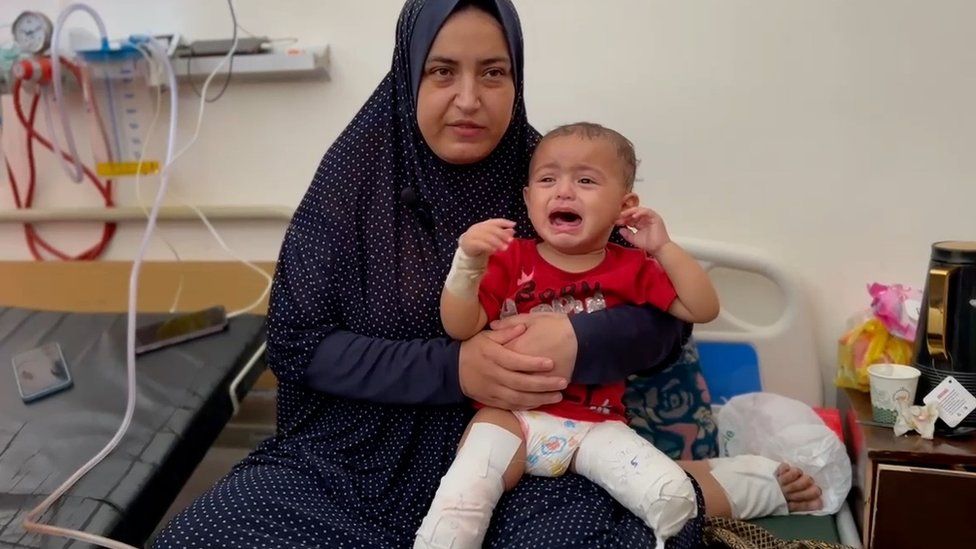-

-
-
Loading

Loading

Nehad Abu Jazar sings softly to comfort her two-year-old daughter Fatima, but it is difficult to imagine how to ease her child's pain when the reality of what has happened is so devastating. On October 17th, Nehad was awakened by the sound of bombing and found herself trapped under rubble. Fatima, who had been in her lap, managed to escape but both of her legs were crushed. In an interview with freelance journalists in Gaza filmed by the BBC, Nehad reveals that Fatima's legs had to be amputated below the knees. Currently in the European Hospital in southern Gaza, Fatima sits in her mother's lap with tears on her face, her legs wrapped in bandages. She cries as if in pain. Nehad and her husband had been trying to have a baby for 14 years, and finally, Fatima was born. Nehad expresses her gratitude that her daughter survived, but questions why she should have to suffer. Nehad wants Fatima to have a normal life like other children. However, Fatima's life now revolves around painkillers, as she is constantly in need of medication and undergoes surgery every other day. A month of intense bombardment on Gaza as a retaliation from Israel for a devastating attack by Hamas has taken a toll on the residents. According to the Hamas-run health ministry in Gaza, at least 10,800 people have been killed, including over 4,400 children. Israel disputes these numbers, but the World Health Organization believes that they are accurate. More than 26,000 people have been injured, many of them left with life-changing injuries like Fatima. In a nearby room, 13-year-old Amira Al-Badawi lies with severe injuries to her spine. It is uncertain if she will be able to walk again. The strike that injured her also resulted in the death of her mother and seven of her brothers. Amira's father, Iyad al-Badawi, shares that they fled their home in Al-Zaytoun after warnings from the Israeli military, only to be bombed in Rafah, where they had sought refuge. Israel has been instructing Gazans to move south for their own safety, but the bombings have continued in central and southern areas of Gaza. Iyad expresses his devastation at losing his wife and children and hopes for peace and security. Amira longs for treatment for her injuries and desires to return to her normal life and home, yearning to feel safe once again. However, there is no home left to return to, and nowhere in Gaza is considered safe. The hospitals are overwhelmed with the dead and wounded, with a large number of them being children. Assef Abu Mazen, an 11-year-old football player, also fell victim to the bombings. Assef's home was destroyed, and he lost his right leg, which had to be amputated below the knee. He had dreams of becoming a professional footballer, but those aspirations have now been shattered. Despite his young age, Assef bravely jokes with hospital volunteers, using laughter as a way to cope with the fear and grief surrounding him. However, his mother reveals that he is scared for his future and worries that his classmates will taunt him for his condition. The article also acknowledges the additional reporting by Majdi Fathi and Haneen Abdeen.